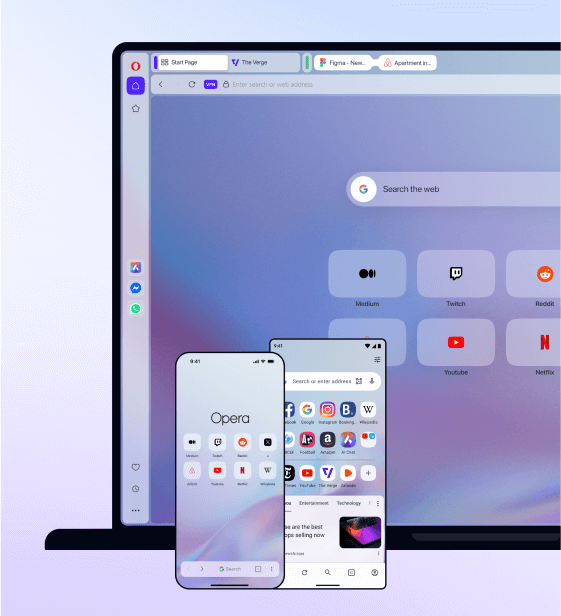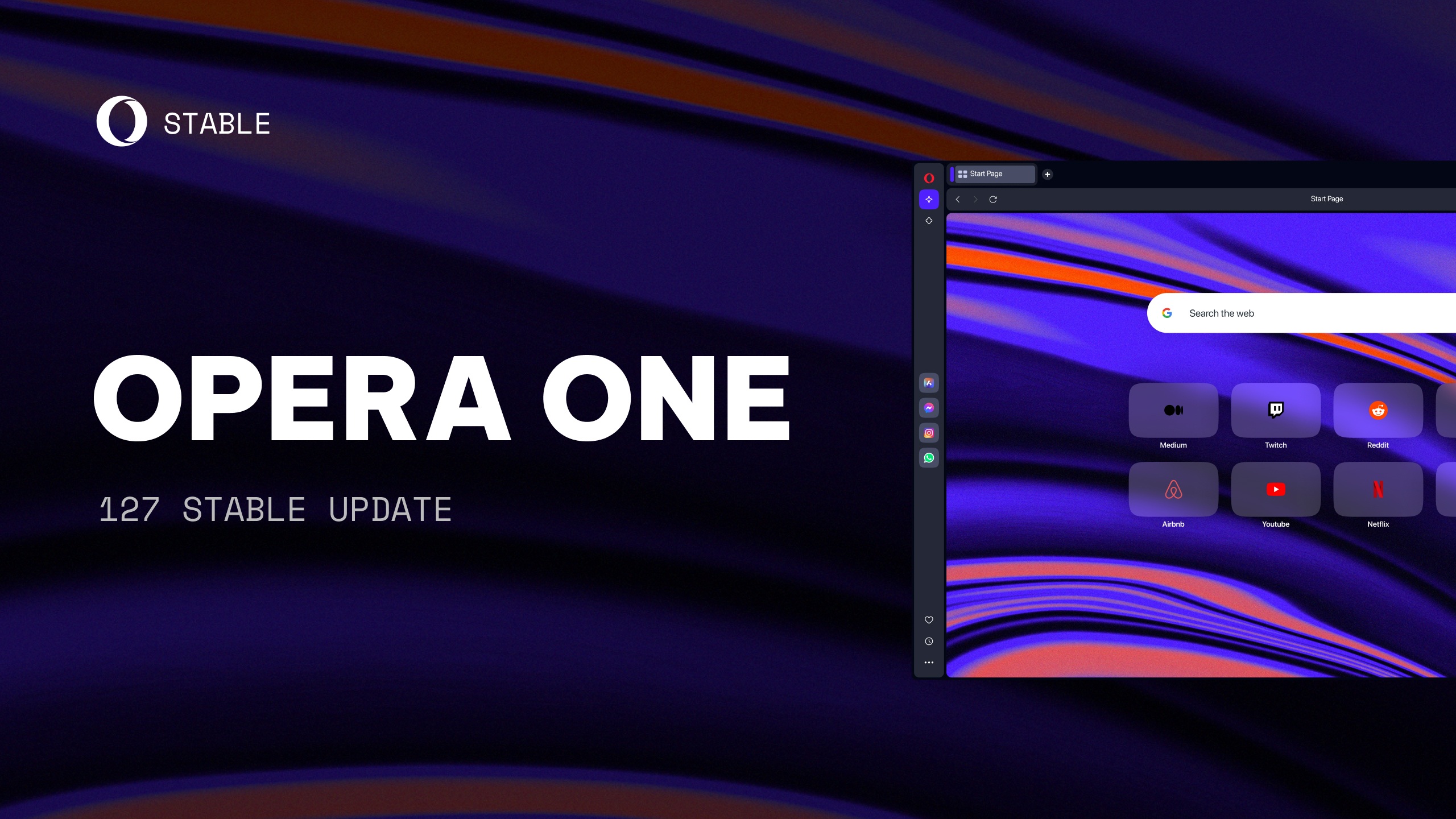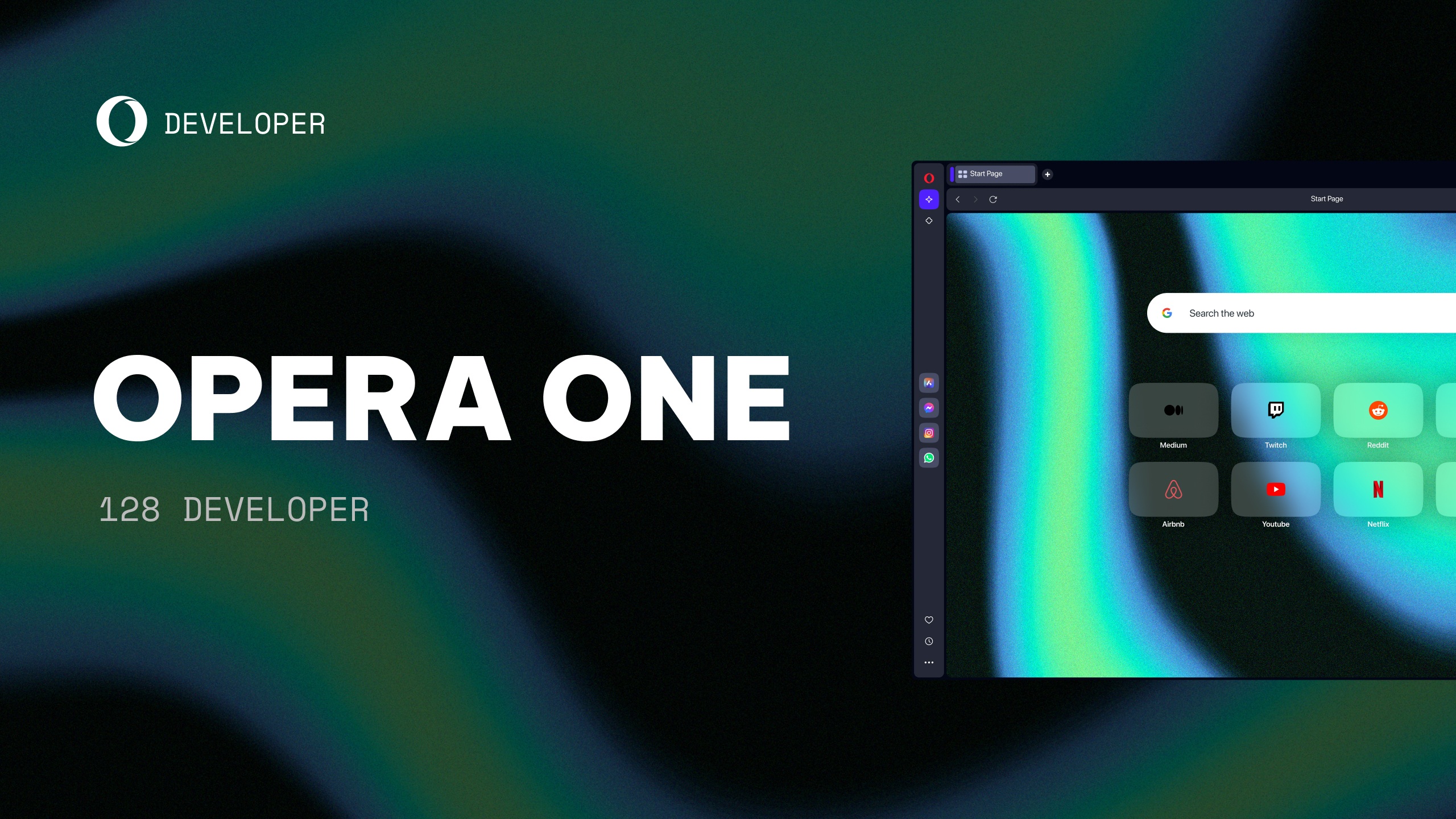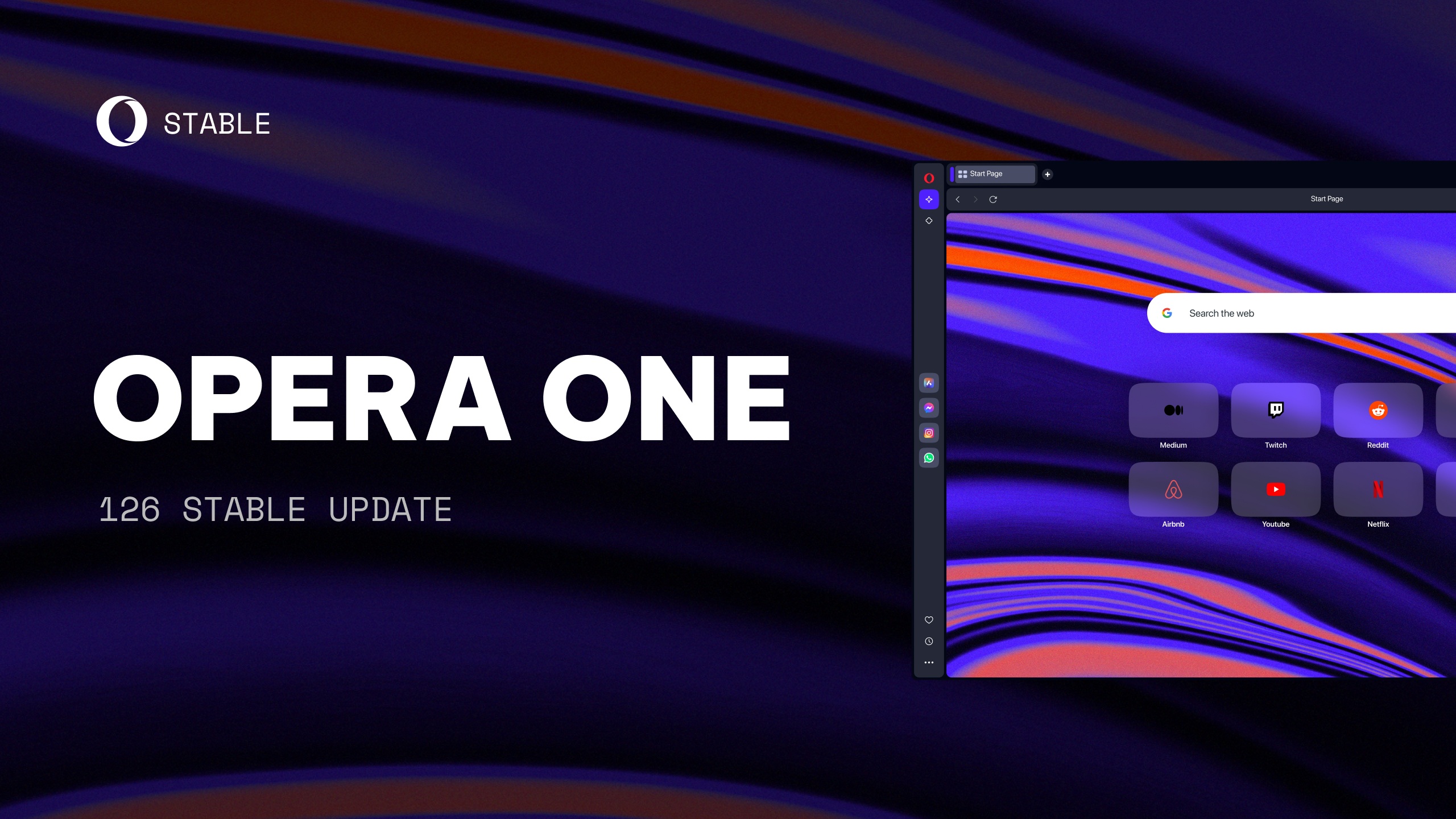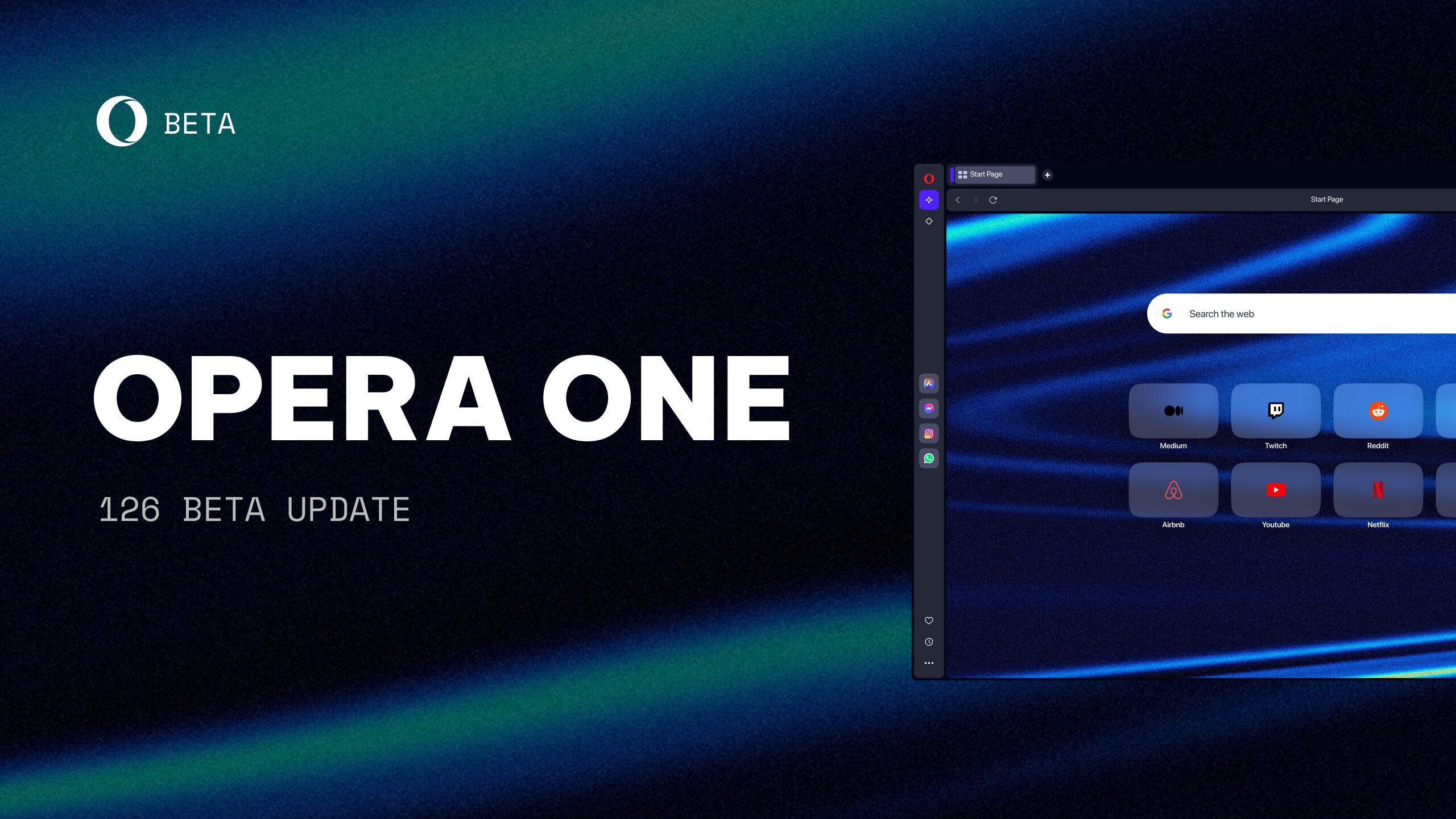Opera launches Opera One R2 – the best Opera Browser to date

Last year we redesigned our browser and released Opera One, a truly AI-ready browser with modular design at its core. With Opera One, we also introduced Aria, our built-in browser AI. And today, we’re unveiling Opera One R2: our best and most beautiful browser to date. Opera One R2 builds on Opera One’s core elements and brings new and useful features to our flagship browser.
Opera One R2 further expands the AI-capabilities of Opera One’s Aria browser AI, building on our experimental AI Feature Drops which we introduced earlier to test AI innovations. Most of these innovative AI-features are making it into the main version of our browser for Windows, MacOS, and Linux. These include an enhanced Command Line with Page Context mode, and new capabilities such as Image Generation and Image Understanding. We also made Aria available to all Opera users without the need for them to log in.
Opera One R2 is also our best-looking browser to date. With this major release, we are introducing dynamic Themes. Dynamic Themes allow you to give your browser a new look that matches your mood and needs – they can be static or animated. They also feature sound effects and music.
With this release, we are also giving you the chance to change the appearance of the UI with Dynamic Themes. Say hello to glass elements! They make the UI transparent so it blends with your background.
Additionally, Opera One R2 brings a couple new features to improve the way you interact with your tabs: Split Screen and Tab Traces. These features help you work on two tabs at the same time or simply see which tabs you have interacted with last.
Last but not least, with Opera One R2 you can now detach the music player that appears when you hover over the player icon – and move it around as you wish. Like with the video pop-out feature, you can now have your music always at hand.
Without further ado, let’s check out what’s coming your way with the release of Opera One R2.
From beta testing feature drops to your desktop
Opera One was the first web browser designed with native browser AI: Aria. Since then, we’ve been constantly working to add and test new AI features – in the Developer stream of the browser – through our AI Feature Drops program.
With the release of Opera One R2, we’re bringing you the best and most useful AI features we tested throughout the year.
Improved Command Line that brings AI to browsing
Opera One R2 brings a more powerful Command Line interface that brings Aria out of the chat box and helps you browse the web aided by AI as you go. When you open the Command Line* – by pressing Ctrl+/ or Cmd+/ – you can switch to the new Page Context mode by pressing the tab key.
This mode allows you to use Aria to summarize the webpage you’re currently viewing. You can also ask questions about the topic you’re browsing and explore it further. Do you have doubts about a product you’re considering buying, or a complicated article? Use Page Context mode.
Page Context mode allows you to do deep dives on a webpage, making it ideal to digest heavy loads of text and information. Now, you can fully dive into those topics that you’ve been researching with Aria’s help.
Image Generation and Image Understanding
One of the most useful AI features that you’ll find in Opera One R2 is Image Generation. You can have Aria generate all sorts of images to help you get inspired with a simple prompt – to get wallpapers, fantasy characters for your novel, and even futuristic inspiration if you want. To use this, you simply need to request an image from Aria in the AI Command Line or the sidebar chat.
When it comes to images, Aria has also got Image Understanding capabilities. You can upload images to Aria to get more information and context about them – making the chat with Aria go beyond only words. Images are an important piece of the web, and it’s good to have a built-in AI that can help you get the most out of every image. You can upload images to Aria from your files in the sidebar chat.
We’re also committed to making Aria as accessible as possible, that’s why we recently made it available for all Opera users without login.
This means that you now have access to all of Aria’s features as if you were signed in, albeit with a limit on image generation – which has been set to be five. Signing into your (free) Opera account will let you increase that limit to 30 images that you can generate every day and for free. To use Aria without login, you need to accept the one-time-only terms of service message.
You can read more about how to use each of Aria’s features in our blog about Aria’s capabilities.
Improved look and design with dynamic Themes
Opera One R2 is here to show you what the future of browsing looks like – literally. The new dynamic Themes are more than just a simple color change or a new background image. They let you alter the entire look and feel of your browser, including animated backgrounds, UI colors, and browser sounds. There’s (background) music with the Midsommar Theme – and more Themes like this will come in the near future. You can even have glass elements! They make the UI transparent so it blends with the background of each Theme.
The new Themes are powered by the Shaders technology and use your device’s GPU for smooth rendering. You can configure each Theme using a multi-dimensional color picker, allowing you to experiment with countless combinations to find your perfect look. You can even adjust the intensity of the background animation’s movement. Now, Themes also support browser sounds and music. They include keyboard and animation sound effects – as well as background music in the Midsommar Theme – which you can configure to your liking.
Three different Themes are making their way into Opera One R2: Classic, Aurora, and Midsommar. The Classic one lets you keep the Opera looks that you’re used to – in case you prefer it – and allow you to tweak the UI colors to your liking. However, the Aurora and Midsommar Themes are quite an update to the browser, to say the least.
The Aurora Theme comes in dark mode only, and transforms your browser into a Northern Lights show. You can choose to have an animated Aurora to make your browser feel like it’s in the middle of the polar night, or you can set it to be static. You can also choose how active the animations of the Aurora are in the multi-dimensional color picker.
Finally, the Midsommar Theme comes in light mode, and brings to your browser the joyful vibes of the midnight sun. Just as with the Aurora one, you can have it animated or static, and choose the intensity of the animation in the color picker. In addition to that, you can also activate keyboard sounds and browser sounds – for actions like opening and closing a tab. But that’s not all, this Theme comes with music that plays in the background and pauses automatically when you play a video or a song – and you can deactivate it at any time if you want.
If you want to know more about Themes, how to configure them, and the tech behind them, check this blog post out.
Improved work with tabs for an improved browser
Tabs have been in the heart of the Opera browser since the very beginning of this feature – we literally introduced them to the browser world back in the year 2000. Then, in 2023 we introduced Tab Islands – a feature that helps you group your tabs intuitively. So, it felt only natural to bring yet another tab-related innovation to Opera One R2: Split Screen. This feature lets you join two tabs, and divide the screen in halves to have them open at the same time.
This feature can be easily activated by dragging down another tab to join your current tab. And, if you want, you can resize the division’s proportion by sliding the dividing bar in the middle to one side or the other. To exit Split Screen mode, click on the three dots in between the two address bars and select “Exit split screen”.
But that’s not all in terms of tabs, there’s another feature making it to Opera One R2 that will make recently visited tabs leave traces. Tab Traces help you quickly find your five most recently used tabs. They highlight them with a subtle underscore, making it easy to retrace your steps. The stronger the underscore’s highlight, the more recently you visited the tab.
These new features join Opera One’s Tab Islands and Workspaces. They work together in harmony to bring true Tabfulness to your Opera One R2 browser.
Detachable music & video controls thanks to Modular Design
One of the things that most of you are probably doing right now, as you read this, is listening to some music – and, why not? Opera One R2 enables you to control your music & video content: now you can control your music and videos without interrupting the flow of your browsing activities.
When listening to music with Opera One R2, you can hover over the player icon – integrated in the sidebar panel – and pause or skip a song in the mini player pop-up. And, what’s more is that you can drag this mini player around to have it always at hand; so you can control your music at all times without the need of switching tabs or apps.
The Player feature allows you to choose your preferred music streaming service and attach it to the sidebar panel. This feature has been made to work in harmony with your browser – for example, it will pause the music whenever you’re playing a video, and resume it whenever you pause it. The same goes for those moments in which you have to answer a call from within the browser – the music will fade out and pause while you’re in the call.
We know that videos are also a huge part of the internet, actually more than two thirds of it. So, when you’re playing a video with Opera One R2 you can detach it in a video pop out window that you can resize to your liking. This feature also works with video calls, which means that you can have your call detached from its tab in a video pop out – making it easier for you to keep browsing while still having an eye out for the things happening in the call.
Built on Multithreaded Compositor
With Opera One, we re-engineered the browser. We integrated a Multithreaded Compositor that manages the rendering of the UI separately, and powers the browser’s modular design. Opera One R2’s Multithreaded Compositor architecture makes the floating modules for your music & video content feel smooth and responsive. You can move these modules around your screen, or even across multiple screens, and resize them to your liking. This takes Opera One R2’s modular design concept to a whole new level.
Robust ad blocking built into the browser
Opera has offered a native ad blocker built right into the browser since 2016, allowing you to browse uninterrupted and keeping intrusive ads at bay. It doesn’t require any additional installation and can be customized according to your wishes. Using the ad blocker makes your browser cleaner, safer, and more private – not to mention faster, since web pages load up to 90% faster without the additional clutter of bulky ads. In addition to that, Opera R2 will continue supporting Manifest V2 extensions, allowing you to continue using your favorite ad blocking and privacy-enhancing extensions just like before.
Download Opera One R2 to experience the browsing of the future
If you want to try all of these features and check out the new looks of Opera One R2 today, you can download it here.
If you want to keep up to date with the latest news from Opera, scroll down to sign-up to our Newsletter.
For more details on the changes and fixes in build 114.0.5282.115, please visit the changelog here.
___________________________________________________________________________________
*The Command Line can be accessed through the shortcut: Ctrl + / on Windows and Cmd + / on Mac. In some cases – and depending on the keyboard layout – the Aria Command Line shortcut can vary due to different positioning of the forward slash ( / ) character, for example, in the Nordics it’s ctrl/cmd + shift + 7.






